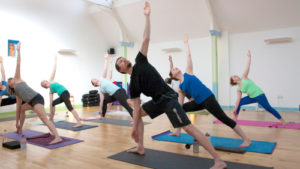Improve Mental and Physical Health with Yoga
By John M. de Castro, Ph.D.
“As an osteopathic physician, I focus a lot of my efforts on preventive medicine and practices, and in the body’s ability to heal itself. Yoga is a great tool for staying healthy because it is based on similar principles.” – Natalie Nevins
Yoga practice has been repeated demonstrated in research studies to be beneficial for the psychological and physical health of the practitioners. But, yoga is a complex of practices including postures, movements, breathing practices and meditation. In addition, there are a wide variety of practices including Vinyoga, Iyengar, Ashtanga, Bikram, Power, Kundalini, Sivananda, Kripalu, Anusara, and Hatha, and others. To better utilize yoga practice for particular issues, it would be useful to examine which components of yoga practice benefits which areas of mental and physical health.
In today’s Research News article “Cross-sectional analysis of health-related quality of life and elements of yoga practice.” See summary below or view the full text of the study at:
https://www.ncbi.nlm.nih.gov/pmc/articles/PMC5282804/
Birdee and colleagues recruited a national sample of yoga practitioners and asked them to complete measures of yoga practice characteristics, including adherence, length of practice, the perceived importance, practice of breathing, movement, and meditation practice, and also health related quality of life, which included measures of global mental and global physical health. They then performed correlational analysis to investigate the relationships between the characteristics of the practice and mental and physical health.
They found that the greater the inclusion of meditation in the yoga practice and the more the practice was in a group, the better the mental health of the practitioners. On the other hand, the longer they were practicing, the greater the teacher training, Viniyoga style, and practicing in a yoga studio, the greater the physical health of the practitioners. These are, of course, correlational findings and thus causal connections cannot be concluded. But the relationships are interesting and suggestive that how yoga is practiced makes a difference. In addition, the results only apply to yoga practitioners and there was no comparison to non-practitioners. So, the overall benefits were not assessed only the relative benefits within practitioners only.
Yoga has been well established to promote physical health. The findings, though, suggest that it is personalized instruction by experienced, and certified instructors, practiced in yoga studios that produces optimum health benefits. Vinyoga is an individualized practice where the instructor develops a personalized yoga program for the student based on such factors as health, age, and physical condition, including past or current injuries or illnesses. This suggests that when it comes to physical health, one size does not fit all. Tailoring the practice to the specific needs of the student is very important. In addition, the more years spent practicing, the greater the health benefits. These results indicate that learning to do yoga properly is a key to better health. Hence, for optimum physical benefit yoga need to be individualized, professionally taught, and practiced over a long period.
The mental health benefits of yoga, on the other hand, are more related to the meditative and social aspects of the practice. It is not surprising that the meditative aspect of yoga was related to mental health as meditation has been demonstrated repeatedly to improve mental health. It is interesting, though, that only this aspect along with practicing socially was associated with better mental health. Perhaps, putting one in greater contact with their inner life is a key.
So, improve mental and physical health with yoga.
“Workout fads come and go, but virtually no other exercise program is as enduring as yoga. It’s been around for more than 5,000 years. Yoga does more than burn calories and tone muscles. It’s a total mind-body workout that combines strengthening and stretching poses with deep breathing and meditation or relaxation.” – WebMD
CMCS – Center for Mindfulness and Contemplative Studies
This and other Contemplative Studies posts are also available on Google+ https://plus.google.com/106784388191201299496/posts and on Twitter @MindfulResearch
Study Summary
Birdee, G. S., Ayala, S. G., & Wallston, K. A. (2017). Cross-sectional analysis of health-related quality of life and elements of yoga practice. BMC Complementary and Alternative Medicine, 17, 83. http://doi.org/10.1186/s12906-017-1599-1
Abstract
Background
Mind-body practices such as yoga have been studied for their generally positive effects on health-related quality of life (HRQOL). The association between how a person practices yoga and the person’s HRQOL is not known.
Materials and methods
Yoga practitioners were sent invitations to participate in an online survey via email. Yoga characteristics, HRQOL, and other sociodemographics were collected. Analyses of data from 309 consenting responders evaluated associations between yoga practice characteristics (use of yoga tools, length of practice, location, method, etc.) and the 10-item PROMIS Global Health scale for both physical and mental health components.
Results
Multivariable regression models demonstrated higher mental health scores were associated with regular meditation practice, higher income, and the method of practicing in a community group class (versus one-on-one). Higher physical health scores were associated with length of lifetime practice, teacher status, Krishnamacharya yoga style, and practicing in a yoga school/studio (versus at home).
Conclusions
Meditation practice in yoga is positively associated with mental health. Length of lifetime yoga practice was significantly associated with better physical health, suggesting yoga has a potential cumulative benefit over time. Different locations and methods of practice may be associated with varying effects on health outcomes. Comparative cross-sectional and longitudinal studies on the variations in yoga practice are needed to further characterize health benefits of yoga.
https://www.ncbi.nlm.nih.gov/pmc/articles/PMC5282804/

Yoga is a natural and side-effect free approach to living a healthy life. Adopting yoga as a regular practice makes the body physically and mentally fit. It restores vigour and enhances the quality of life. The effects of yoga take time to manifest so don’t give up and be regular with your practice. Stretch on the yoga mat a little and relieve your body of pain, permanently!